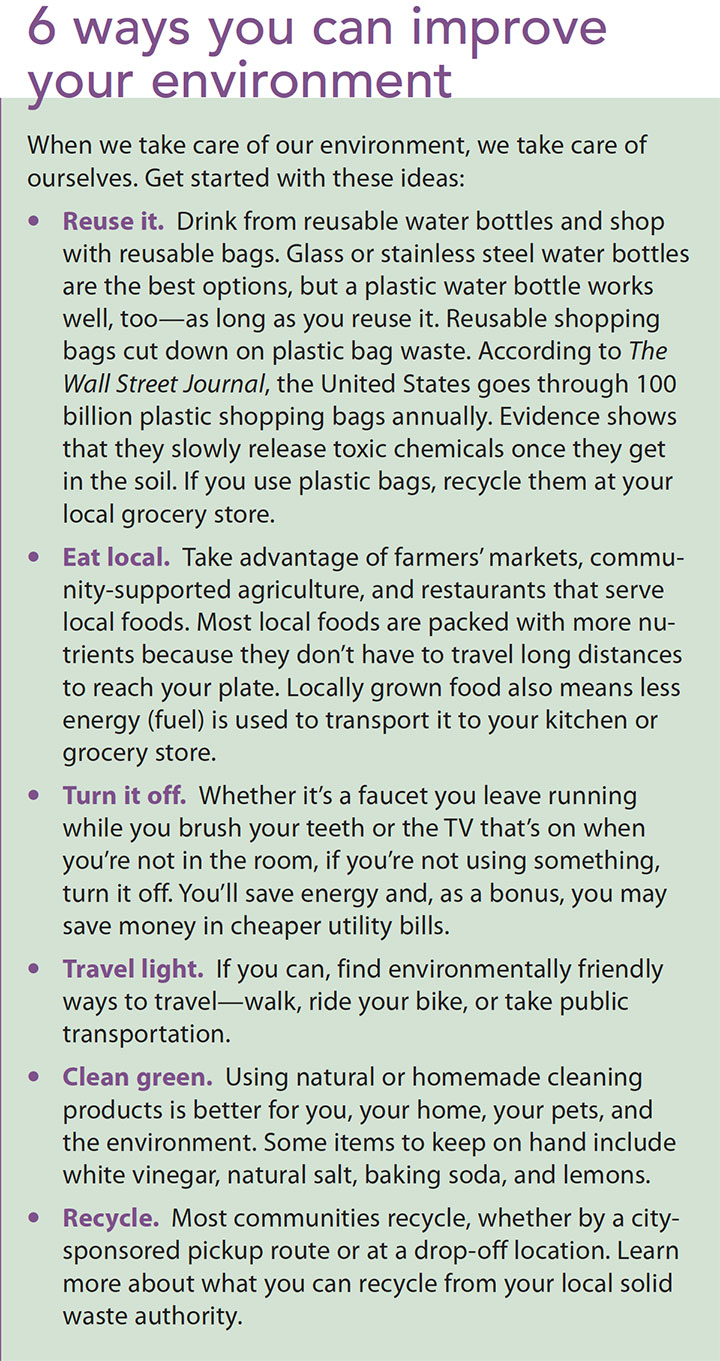Pay attention to your environment—it can affect your body, mind, and spirit.
Takeaways:
- Increasing awareness of your surroundings can improve overall well-being.
- Paying attention to your environment is especially important at work.
- Take advantage of and use effective strategies for handling difficult patients.
- Positive energy and healthy habits can contribute to a better environment.
By Megan Amaya, PhD, CHES; Bernadette Mazurek Melnyk, PhD, RN, APRN-CNP, FAANP, FNAP, FAAN; Susan Neale, MFA
This is the ninth installment in a series of articles on wellness. You can read the earlier articles at myamericannurse.com/category/wellness101/.
YOU DON’T HAVE TO GO FAR to experience nature—it can be in your own backyard, a community park, or walking trail. You also can venture miles from home for hiking, waterskiing, camping, or canoeing. When you’re outdoors, the rest of life seems to disappear. You become “one with nature”—spiritually, mentally, and physically—as you appreciate all the beauty this planet has to offer.
 Your senses heighten as you become more aware of your surroundings. And you may not realize it, but you’re improving your health and well-being. Yes, outdoor activities, from a simple walk around the block to snow tubing down a wintry hill, enhance your overall health.
Your senses heighten as you become more aware of your surroundings. And you may not realize it, but you’re improving your health and well-being. Yes, outdoor activities, from a simple walk around the block to snow tubing down a wintry hill, enhance your overall health.
We may not give a lot of thought to how the environment fits into our wellness efforts, but the environment and how we take care of it can have a huge impact on our overall well-being.
The evidence is in
Research has demonstrated that green space, such as parks, forests, and river corridors, are good for our physical and mental health. In a study by Blumenthal and colleagues, 71% of people found a reduction in depression after going for a walk outdoors, versus a 45% reduction in those who took an indoor walk. In a 2013 study from Roe and colleagues, gardening demonstrated a significant reduction in subjects’ levels of the stress hormone cortisol. And in 2016, the World Health Organization conducted a systematic review of 60 studies from the United States, Canada, Australia, New Zealand, and Europe and concluded that green space is associated with reduced obesity.
More than nature
“Environment” doesn’t mean only the great outdoors. Your environment is everything that surrounds you— your home, your car, your workplace, the food you eat, and the people you interact with. Nurses’ work environments contain many hazards, so we need to pay extra attention to this component of our wellness. The U.S. Department of Labor rates hospitals as one of the most dangerous places to work. In 2017, the Bureau of Labor Statistics reported that private-industry hospital workers face a higher incidence of injury and illness—six cases per 100 full-time workers—than employees working in other industries traditionally considered dangerous, such as manufacturing and construction. In 2015, the most common event leading to injuries in hospitals was overexertion and bodily reaction, including injuries from moving or lifting patients. In other words, those of us working with patients outside of a hospital setting are vulnerable, too.
Improve your workplace environment
The good news is that many injuries can be prevented with proper equipment and training. For in- stance, almost 50% of reported injuries and illnesses among nurses and other hospital workers were musculoskeletal, many (25% of all workers’ compensation claims for the healthcare industry in 2011) caused by overexertion from lifting, transferring, and repositioning patients. Learning safe ways to handle patients can safeguard your well-being as well as your patients’. It may be time to review your workplace safety standards or form a committee to review patient-handling procedures and other safety measures.
Of course, the people we deal with every day aren’t just risk factors for disease and injury. Everyone brings his or her personalities, attitudes, and behaviors, and we can’t always avoid the stress they add to our environment. We can, however, cushion ourselves against stress by modifying our own behavior.
Nurse.org offers these suggestions when dealing with a difficult patient:
- Avoid defensive thoughts. Remember, it’s not about you, it’s about the patient. Don’t blow up at him or her because you’re
- Set boundaries. If someone behaves inappropriately toward you by swearing or yelling, set limits by saying, “There are certain things we allow here, and this behavior is not one of them. I’ll step out of the room to give you time to calm”
- Let them tell their story. Letting a patient tell you how he or she got to this point can help reduce distress and might give you insight into the behavior. Even if you don’t agree with what the patient says, he or she will feel listened to, which may be calming.
- Realign your body language. Taking a few measured breaths to refocus your thoughts can help you calm down. Tension can create defensive body language that patients may react to negatively.
Choosing to thrive
Studies show that we thrive better when surrounded by people who support our goals and want to help us succeed. We can’t usually choose the people we work with, but we can consciously choose to spend more time with those friends and family members who support and uplift us.
And we can all contribute to making our physical surroundings healthier, from recycling to creating a culture of respect and gratitude. (See 6 ways you can improve your environment.) Start with a small step today—at work, at home, at school, with your family, or by volunteering in the community—to improve your environmental wellness.

The authors work at The Ohio State University in Columbus, Ohio. Megan Amaya is director of health promotion and wellness and assistant professor of clinical nursing practice at the College of Nursing and president of the National Consortium for Building Healthy Academic Communities. Bernadette Mazurek Melnyk is the vice president for health promotion, university chief wellness officer, dean and professor in the College of Nursing, professor of pediatrics and psychiatry in the College of Medicine, and executive director of the Helene Fuld Health Trust National Institute for Evidence-based Practice in Nursing and Healthcare. Susan Neale is senior writer/editor of marketing and communications in the College of Nursing.
Selected references
Blumenthal JA, Babyak MA, Moore KA, et al. Effects of exercise train-ing on older patients with major depression. Arch Intern Med. 1999; 159(19):2349-56.
Bureau of Labor Statistics. Hospital workers: An assessment of occupational injuries and illnesses. June 2017.
Cohen DA, McKenzie TL, Sehgal A, Williamson S, Golinelli D, Lurie N. Contribution of public parks to physical activity. Am J Public Health. 2007;97(3):509-14.
Groenewegen PP, van den Berg AE, de Vries S, Verheij RA. Vitamin G: Effects of green space on health, well-being, and social safety. BMC Public Health. 2006;6:149.
HealthyPeople.gov. Environmental health.
Nelson L. 10 tips for dealing with difficult patients. Nurse.org. February 20, 2018.
Occupational Safety and Health Administration. Safe Patient Handling Programs: Effectiveness and Cost Savings.
Roe JJ, Thompson CW, Aspinall PA, et al. Green space and stress: Ev- idence from cortisol measure in deprived urban communities. Int J Environ Res Public Health. 2013;10(9):4086-103.
World Health Organization. Ambient (outdoor) air quality and health. May 2, 2018.
World Health Organization. Urban green spaces and health: A review of evidence. 2016.
ant9-Wellness Environment-822a


















